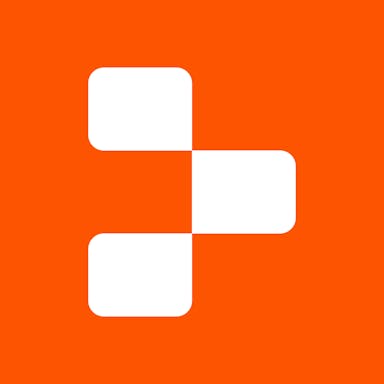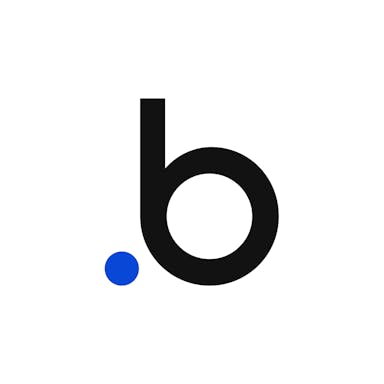Thesis
Building software is one of the factors leading to innovation and economic prosperity. Yet today, fewer than 1% of people globally possess the skills necessary to develop software independently, leaving the vast majority of ideas trapped behind barriers of technical complexity. Concurrently, global technology expenditures are on an upward trajectory. Global tech spending for 2025 is projected to grow to $4.9 trillion, with software and IT services expected to account for two-thirds of this expenditure. This substantial financial commitment reflects the growing reliance on software solutions to drive innovation and efficiency across industries.
Imagine a world where anyone can seamlessly transform their ideas into functional, high-quality software applications regardless of their coding ability. The rapidly accelerating wave powering this transformation is the emergence of artificial intelligence capable of autonomously generating software from simple, natural language prompts. This technological shift goes far beyond incremental improvements in developer productivity; it represents a fundamental paradigm shift in how software is conceived, built, and scaled. As AI continues to improve, it's not just software developers who benefit; suddenly, anyone, from entrepreneurs to designers, marketers to educators, can become software creators.
Lovable is an AI full-stack engineer built to be a comprehensive AI platform capable of building entire web applications, complete with front-end and back-end functionality, through conversational prompts. The company’s mission is to “build the last piece of software” and make software creation accessible to everyone. While some existing no-code solutions can be constrained by rigid templates or developer-centric AI tools, Lovable democratizes software creation by enabling non-technical users to create functional applications rapidly.
The platform’s differentiation lies in its use of multiple advanced AI models, orchestrated to handle complex software tasks reliably. Lovable’s approach drastically shortens the software development cycle, often reducing development times by as much as 90%, which can empower individuals and teams to move from concept to deployment in hours or even minutes rather than days or weeks. The result accelerates innovation cycles, which is especially valuable in startup environments, internal corporate tooling, and rapid prototyping. As Anton Osika, the co-founder and CEO of Lovable, explains:
“Less than 1% of the world’s population can code, which is a significant drag on innovation. Imagine if anyone with a powerful idea could turn that idea into a product. This is the vision we’re making a reality at Lovable.”
Founding Story
Anton Osika (CEO) and Fabian Hedin (CTO) co-founded Lovable in November 2023, aiming to democratize software development by enabling non-coders to bring their ideas to life.
After graduating from the KTH Royal Institute of Technology in Stockholm in 2015, Osika was the first technical hire at the investment firm Ampfield Aktiebolag. In 2017, he was the first hire and founding engineer at the Enterprise AI startup Sana, where he helped build and scale the learning platform. Osika's prior experiences prepared him for joining Depict as a co-founder and CTO in 2020. Depict is a YC startup founded in late 2019 that builds AI-powered product recommendations for ecommerce websites. The company secured $20 million in total funding from investors such as Initialized Capital, Tiger Global, YC, and EQT Ventures.
Osika and Hedin worked together at Depict, where Hedin was a front-end engineering lead from February 2022 to January 2023. Prior to that, Hedin built the proptech firm TenFAST, developed the computer interface used by physicist Stephen Hawking, and collaborated with former SpaceX engineers on wheelchair technology.
In mid-2023, while at Depict, Osika developed GPT Engineer, an open-source tool that demonstrated the potential of large language models to write functional code from simple prompts. The tool rapidly gained popularity and became one of the fastest-growing GitHub repositories at the time. As of April 2025, GPT Engineer has 54K GitHub stars.
After the success of the open-source GPT Engineer, Osika and Hedin iterated on it and, in late 2023, launched a commercial version called "GPT Engineer App," targeting non-technical users. The app quickly gained prominence after landing on the front pages of Product Hunt and Hacker News, drawing in hundreds of paying users overnight and receiving a five-star rating with 75+ five-star reviews at launch. Parallel with the GPT Engineer App launch, Osaka and Hedin officially co-founded Lovable. A year later, in December 2024, the app was formally renamed Lovable.
Product
Overview
Lovable is an AI platform that turns natural language prompts into working full-stack web applications. The app eliminates the complexity of traditional app-creation environments by combining coding, deployment, and collaboration in a single interface.
Lovable can build anything from simple websites to complex web apps with authentication, databases, and API integrations all within one tool. It leverages React and Vite for efficient front-end development. It also integrates natively with Supabase for its back-end services and Stripe for payments and features bidirectional integration with GitHub, enabling streamlined collaboration and continuous deployment workflows. Lovable has a growing list of verified and unverified APIs, allowing users to create and leverage the external tools they need to build a unique product and experience.
The founders see it as strategically important not to rely on a single LLM but instead employ a "smart routing" system that leverages specific LLMs based on context, complexity, speed, and cost. Specifically, it uses the following models and describes their advantages this way:
OpenAI: Ideal for summarization, analysis, and content generation. Fast and reliable.
Google: Strong in logical reasoning and long-context processing.
Groq: The fastest AI model in Create, powered by Llama 3.
Cohere Command R+: Scalable LLM designed for business applications.
How It Works
To start their first project, users describe what they want to build in plain English, providing as much context as possible. Lovable then generates production-ready code in real time.
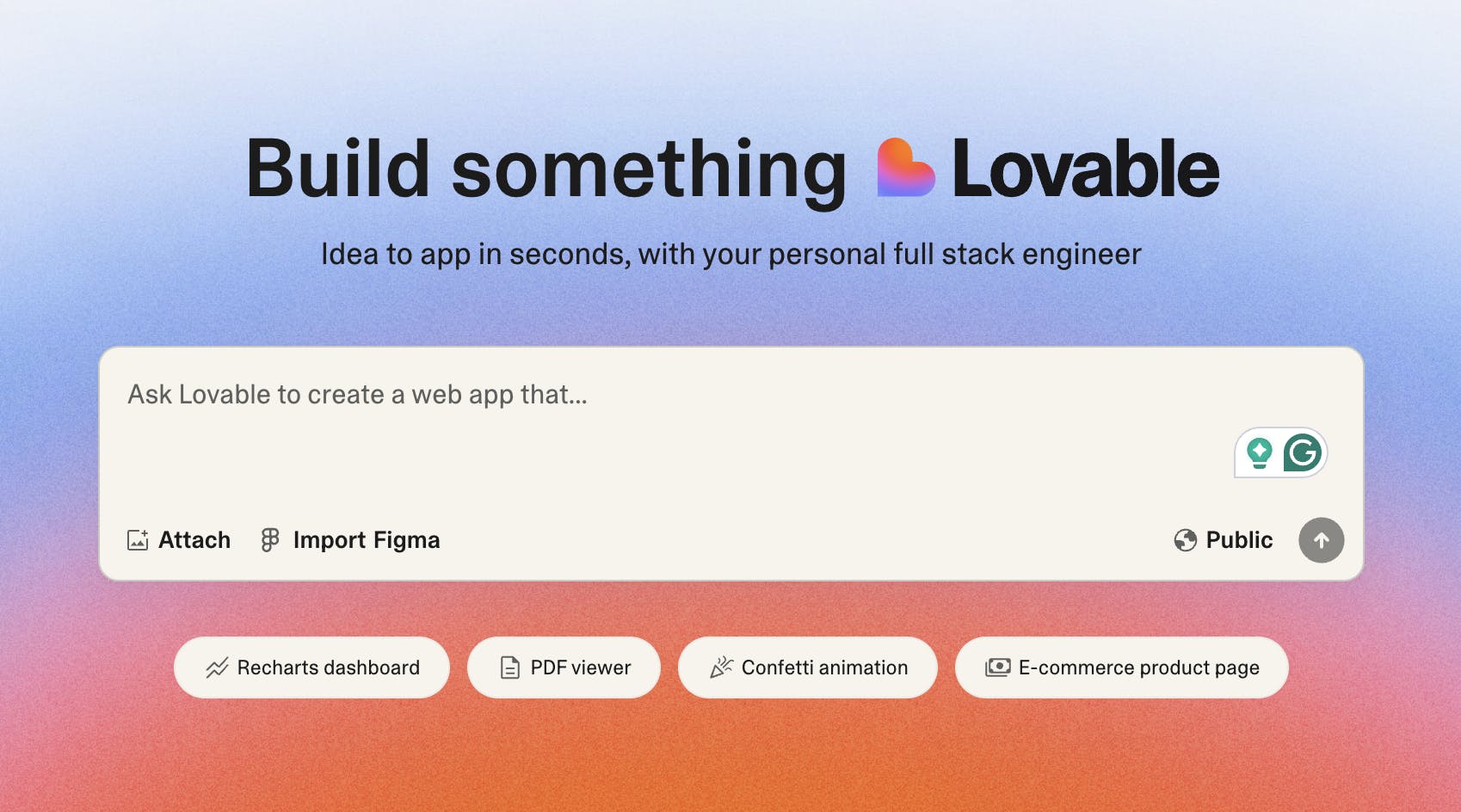
Source: Lovable
Alternatively, Lovable provides several additional methods to initiate new projects tailored to specific user needs. Users can select from Lovable's collection of pre-built templates, which are ideal for common project scenarios. They can also accelerate development by enhancing or adapting existing public projects or their previous work. For users working with external design tools, Lovable supports direct uploads from platforms like Figma, streamlining the integration of designs. Additionally, users can convert their own UI sketches into interactive projects by uploading drawn concepts. Lastly, Lovable offers the capability to replicate the structure of an existing website by capturing and uploading a screenshot, effectively cloning its layout.
Once the initial prototype is ready, users can refine their projects by using the chat-based interface or selecting components directly on the page. For technical users, Lovable also has a code editor for specific edits. Paid tiers can also collaborate on projects with friends and teammates. Projects that require a backend can be connected to Supabase by clicking the button at the top right and following the steps. Users can also prompt the chat to integrate with Stripe and Resend if the app will collect payments or use email capabilities.
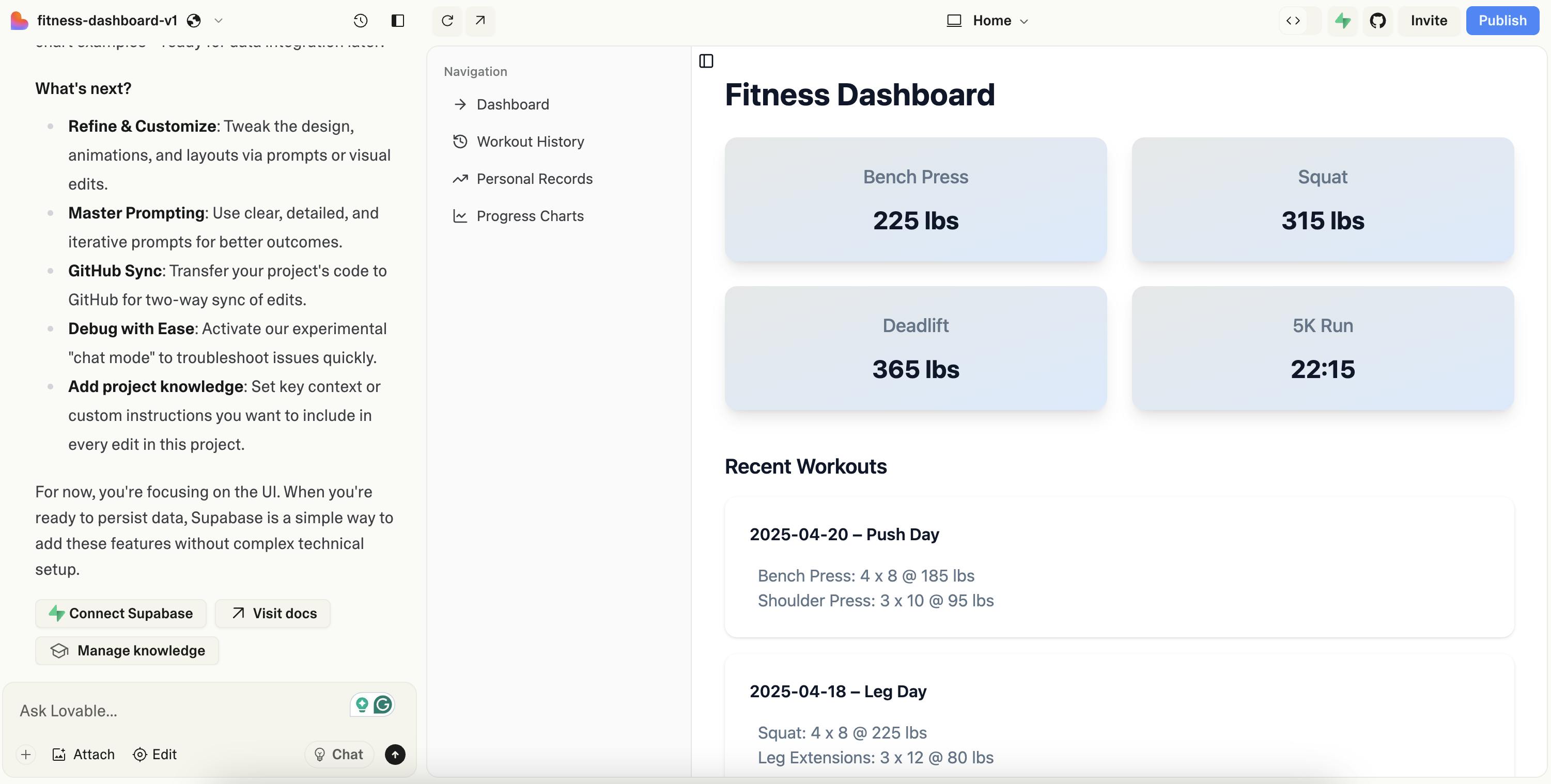
Source: Lovable
Applications can be rigorously tested before deployment. Lovable provides options to toggle between web and mobile views, ensuring responsiveness and optimal performance across devices. Real-time updates are instantly viewable upon refreshing the preview, enabling thorough testing of user interactions, navigation flows, and all functionalities.
Once the application is ready, projects can be transferred directly to GitHub for version control and collaboration. Then, the application is published live, which is on a Lovable staging subdomain by default. Users can also connect a custom domain they own using Entri or buy a domain directly in Lovable.
Market
Customer
Lovable is focused on expanding the market for software development by targeting non-technical users who are currently unable to bring their ideas to life due to the complexity of building software. As Osika explains: “I saw there’s something even larger I can do here, giving the 99% of the population who don’t know how to code access to a software engineer through AI.”
As of February 2025, Lovable was used by solo entrepreneurs turning ideas into businesses, product designers going straight from idea to prototype, and sales teams building and showcasing interactive product features live. Some users have also raised funding on top of apps they built on Lovable. With the launch of the code editor in April 2025, Lovable is also targeting experienced developers looking for more flexibility and code access.
Market Size
The global software market was worth $737 billion in 2024 and is expected to reach around $2.25 trillion by 2034, expanding at a CAGR of 11.8% from 2024 to 2034. In addition, the AI-assisted development market is projected to reach $43 billion by 2028. A broader consideration is how the landscape of software development might fundamentally shift once AI enables a far larger and more diverse audience to create software. As AI simplifies the creation of software applications, it may actually increase the production of and demand for software.
Drawing a parallel to Uber's market evolution, initial assessments in 2014 of Uber's total addressable market (TAM) were based on the existing taxi and limousine industry, estimated at $100 billion. However, what analysts missed was the likelihood of Uber's model expanding the market far beyond these projections, illustrating how new technologies can create and expand addressable markets and capture a larger share. Similarly, AI-driven platforms like Lovable have the potential to redefine the software development landscape, leading to a market size that could surpass current estimations as new user segments emerge and the demand for customized software solutions grows.
Competition
Lovable operates in a highly competitive market for software creation tools; what Andrej Karpathy calls “vibe coding”: giving instructions in natural language and letting AI write the code. The company contends with existing players such as Replit, Vercel, Cursor, and Bolt. The platforms offer varying functionalities, from more technical tools focused on experienced developers to more straightforward end-to-end solutions targeting non-technical people.
Bolt.new by StackBlitz: Launched in 2024 by StackBlitz, Bolt.new is an AI-powered, browser-based development platform that enables non-technical users to build, edit, and deploy full-stack applications using natural language prompts without requiring a local setup or coding expertise. Built on StackBlitz’s proprietary WebContainer technology, which allows Node.js environments to run entirely in-browser, Bolt.new gives AI models full control over the development environment, including the file system, package manager, and browser console. Originally founded in 2017, StackBlitz grew to 2 million users by 2022. In January 2025, the company raised $105.5 million in a Series B round at an estimated valuation of $700 million. The round was led by Emergence and GV, with participation from Madrona, Mantis, and Conviction, bringing total funding to $113.4 million. As of March 2025, Bolt.new generated $40 million in ARR.
v0 by Vercel: Announced in 2023 by Vercel, v0 is an AI-powered platform designed to generate user interfaces from text descriptions, streamlining the web development process. The platform leverages Vercel's expertise in front-end development to offer developers a tool that translates natural language prompts into functional UI components. In May 2024, Vercel secured a $250 million Series E funding round led by Accel at a $3.3 billion valuation. Notable investors also include CRV, GV, Notable Capital, Bedrock, Geodesic Capital, Tiger Global, 8VC, and SV Angel.
Cursor by Anysphere: Launched in 2023, Cursor, developed by Anysphere Inc., is an AI-powered code editor designed to enhance developer productivity through features like code generation, intelligent autocompletion, and codebase understanding. Typical Cursor users are software engineers looking for tools that make their lives easier. In contrast, non-technical users would likely have a more challenging time using Cursor compared to other tools. In December 2024, Anysphere raised $105 million in a Series B funding round led by Thrive Capital and Andreessen Horowitz at a $2.5 billion valuation. In May 2025, Anysphere raised a $900 million funding round, led by Thrive Capital, with participation from Andreessen Horowitz and Accel, valuing the company at $9 billion and bringing the total funding raised to $1.1 billion. As of June 2025, Cursor generated $500 million in ARR.
Replit Agent: Founded in 2016, Replit* offers a browser-based collaborative, integrated development environment (IDE) that makes programming more accessible. In September 2024, the company introduced Replit Agent, an AI system for both experienced developers and novices that can create and deploy applications using natural language prompts. In February 2025, Replit announced v2 of Agent, leveraging Anthropic’s Claude 3.7 Sonnet, claiming the update provided a tool that is “fundamentally more autonomous.” In April 2023, Replit raised $97.4 million in a Series B funding round led by Andreessen Horowitz, reaching a valuation of $1.2 billion. Other investors included Khosla Ventures, Coatue, SV Angel, Y Combinator, Bloomberg Beta, and A.Capital. As of June 2025, Replit’s total funding was $222 million.
Windsurf: Launched by Codeium in November 2024, Windsurf is an AI-powered code editor designed to streamline the software development process using Cascade, its AI agent. Codeium later rebranded to Windsurf. Like Cursor, Windsurf is a tool for experienced developers that provides smart autocompletion, AI-driven code generation, interactive in-editor chat, and context-aware code editing. In August 2024, Codeium raised $150 million in a Series C funding round led by General Catalyst, achieving a valuation of $1.25 billion. As of April 2025, Codeium’s total funding is $244.7 million. As of April 2025, Codeium generated $100 million in ARR. In early May 2025, OpenAI agreed to acquire Windsurf for about $3 billion.
Business Model
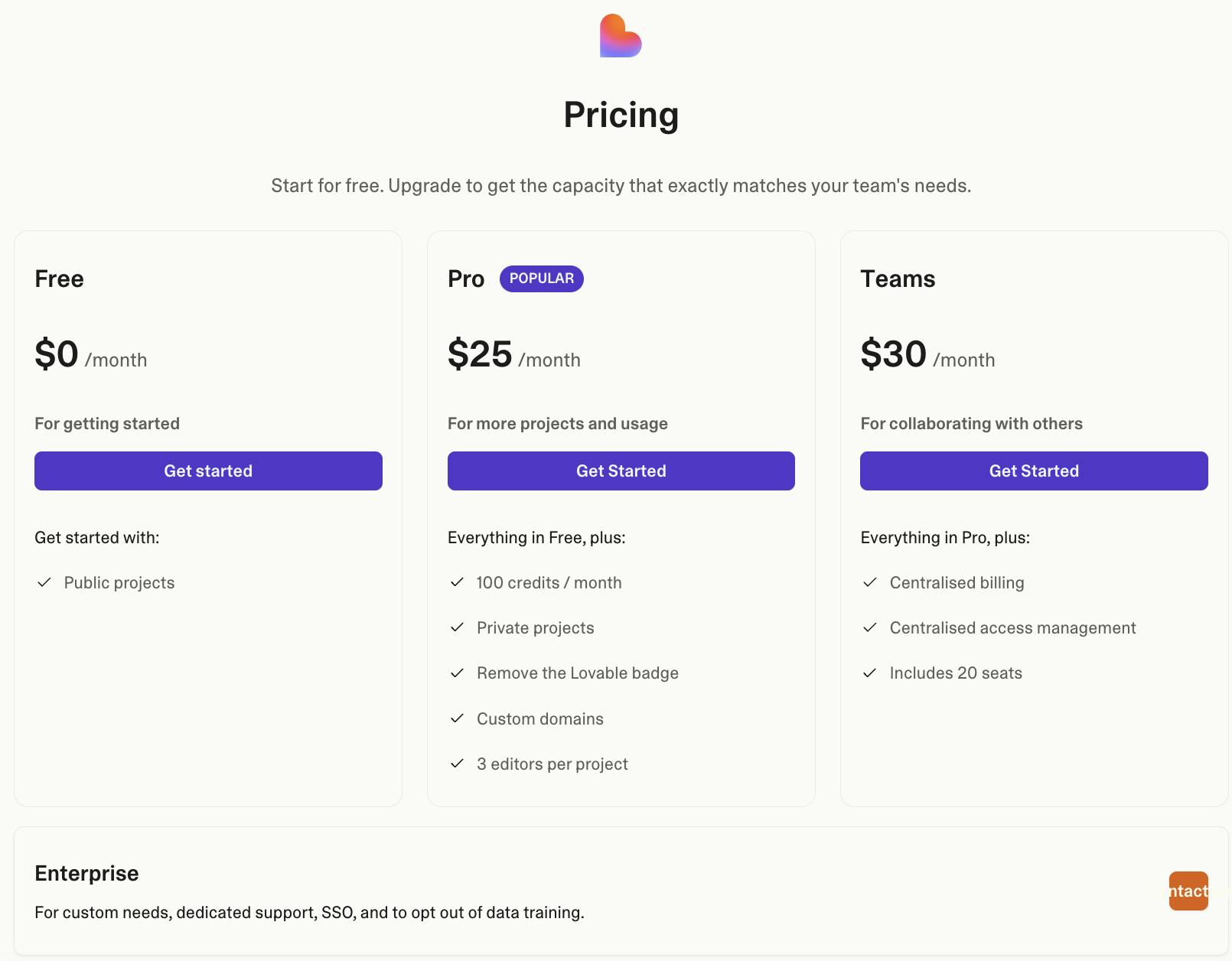
Source: Lovable
As of June 2025, Lovable’s core product is its AI software development platform. It is sold through a freemium subscription model with usage-based monthly pricing, depending on user needs. Lovable offers three primary tiers: Free, Pro, and Teams. These plans differ in terms of messaging limits, collaboration capabilities, and feature access. The Free plan is typically for newcomers who are looking to try out Lovable’s core functionality. The Pro plan is targeted at individual creators and small teams. It boosts message capacity while adding premium features like custom domains, collaboration capabilities, and the ability to remove Lovable branding. The Teams plan encompasses all Pro features and adds centralized billing, centralized access management, and includes 20 seats. This plan is suitable for organizations requiring shared workspaces and team management capabilities.
Traction
Lovable had two failed attempts to launch in the spring and summer of 2024 under the name "GPT Engineer App." The tool did not achieve significant traction the first two times due to failed validation of user needs, brand disconnect, causing users to underestimate the tool’s capabilities, and timing challenges related to the readiness of the AI market. Lovable’s third and successful launch was the result of rethinking its product, audience, and go-to-market strategy. The team rebranded the product to “Lovable,” listened to its target users, and added functionality (like the Supabase integration), which made the product feel more complete and usable for real projects, not just demos or prototypes. Lovable also expanded its go-to-market strategy through a strategic focus on Product Hunt, increased engagement with developer communities and influencers, and supported the launch with educational content like tutorials, demos, and feature highlights.
Following its third launch, Lovable became one of the fastest-growing European startups. In the first four weeks of its third launch, the company reached $4 million ARR, which increased to $10 million ARR in the first two months. By February 25, 2025, Lovable had reached $17 million ARR, with over 30K paid users, 25K projects created daily, and more than 1.2 million apps built since launch. As of March 2, 2025, Lovable had 10.4 million website visits over the last 28 days, outpacing its core competitors like Replit, Bolt, and v0 by more than 30%. As of March 11, 2025, Lovable had over 45K paid customers, reaching 50% growth in paid users in less than a month. As of March 25, 2025, Lovable was adding close to $2.5 million ARR weekly, with retention rates above 85%. As of May 2025, the firm officially reached $50 million ARR.
Valuation
In October 2024, Lovable raised €6.8 million (~$7.5 million) in a pre-seed funding round. The round was led by Hummingbird Ventures and byFounders, and included a roster of angels such as DeepMind alumni, AI founders, and notable tech executives (e.g., Mattias Miksche, Bjarke Staun, Siavash Ghorbani of Shopify, Fredrik Hjelm of Voi, and Creandum co-founder Stefan Lindeberg). In February 2025, Lovable secured $15 million in a Series A round led by Creandum. Angels like Charlie Songhurst (former Microsoft executive), Adam D’Angelo (Quora CEO), and Thomas Wolf (Hugging Face co-founder) also participated. This brought Lovable’s total funding to $22.5 million.
Key Opportunities
Mass Market Adoption
The AI-assisted development market is projected to reach $43 billion by 2028, while the overall software market is expected to expand to $1.2 trillion during the same period. Lovable sits at the forefront of a movement to let millions of non-developers build software. By reducing development time by 90% for common apps, it can unlock a huge new user base (entrepreneurs, creatives, SMBs) who previously may not have been involved in software creation. This democratization of creation is a tidal wave opportunity, and companies like Lovable can leverage a full-stack integrated approach to software development to capitalize on that.
Integrate Marketing, Analytics, & Distribution Tools
Beyond engineering, there are many other critical aspects involved in building and growing a successful product. Building upon its core functionality, Lovable can expand its value proposition by introducing integrated tools that not only assist users in developing software but also empower them to effectively improve and grow their apps through built-in solutions such as analytics suite, AB testing, paid ads, referral programs, SEO optimization, and more. Similar strategies have been introduced in related markets by platforms like Substack and Beehiiv, which first established user bases through accessible newsletter creation tools before boosting growth through additional marketing and analytics features. By incorporating these comprehensive marketing tools, Lovable can enhance user success, platform stickiness, and also potentially position itself as a holistic solution in a crowded market.
Enterprise Market
The enterprise development tools market represents a more than $100 billion opportunity. While currently focused on individual users and small teams, Lovable can expand into the enterprise market by developing robust enterprise-grade offerings. The company’s existing integrations with GitHub and compatibility with widely adopted tools like VS Code already align with enterprise workflows, providing a strong foundation for capturing larger organizations aiming to accelerate development cycles and streamline collaboration. Lovable can leverage its intuitive user experience, easy integrations, and evolving AI capabilities to penetrate and capture market share in the enterprise space.
Key Risks
Competitive Landscape
The AI app-building space has become increasingly competitive. In January 2025, Bolt raised $105.5 million, while Anysphere, the maker of Cursor, secured $900 million in May 2025. Additionally, in early April 2025, Replit was rumored to be negotiating a large funding round at a multi-billion-dollar valuation. In February 2025, Anthropic also launched Claude Code, followed by OpenAI's release of Codex CLI in mid-April 2025—both agentic coding tools designed to integrate directly into developers' terminals. While the focus is on experienced developers, it should not come as a surprise if both Anthropic and OpenAI look to leverage their large user bases to expand into coding by non-technical users. In fact, in May 2025, it was reported that OpenAI agreed to acquire Windsurf for about $3 billion, a move that would signal a serious push into the developer tools market. Lovable could lose momentum if a competitor builds a more accurate or easier-to-use tool, or undercuts on price via its own AI models.
Dependency on LLM Providers
As of June 2025, Lovable relies heavily on third-party large language models (OpenAI’s GPT-4, Anthropic’s Claude, etc.) for its core functionality. While model diversification through its “smart routing system” mitigates some risks, the lack of an in-house model could expose Lovable to upstream AI supply risks. Any change in those providers’ pricing, terms, or performance (e.g., rate limits, cost hikes, model updates) could directly hurt Lovable’s service or margins.
Scaling & Stability
At times, Lovable’s hypergrowth has outpaced its infrastructure. For instance, the company had to urgently rewrite parts of its engine from Python to Go to handle the load, and some users have reported early stability issues. Rapid scaling can introduce technical debt and bugs in an AI system of this complexity. If the platform crashes, produces errors, or loses projects under high load, it could erode user trust. Maintaining reliability at scale will be a continual challenge (and resource drain) as usage grows exponentially.
Product Quality & Security
As AI generates complete applications, any mistake can be costly. Bugs or vulnerabilities in generated code (especially for complex apps) could lead to security holes or broken functionality that non-expert users might not catch. While Lovable’s selling point is production-ready output, its reputation could suffer if it ever produces a high-profile failure or a flawed app that causes business issues. Ensuring rigorous testing, perhaps code audits or sandboxing, is vital to avoid trust-damaging incidents as the system grows more complex.
Summary
The global software market is projected to reach $2.25 trillion by 2034, growing at a CAGR of 11.8%. Within that, the AI-assisted development market is expected to reach $43 billion by 2028. Lovable is building an AI application builder for non-technical users who want to create software but lack coding skills. By allowing users to generate full-stack applications through natural language, Lovable is meant to reduce development time and broaden access to software creation. The company reached $17 million ARR and over 45K paid users within months of launch. With established integrations into developer workflows and plans to expand into enterprise and growth tooling, Lovable could capture a meaningful share of the expanding market. The main questions ahead are whether the company can maintain product quality and platform reliability as it scales and how it navigates its dependency on third-party AI models in a competitive landscape.
*Contrary is an investor in Replit through one or more affiliates.


